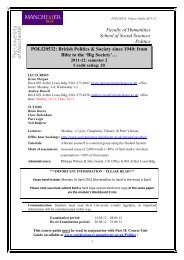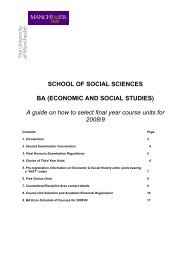CHNN 22, Spring 2008 - School of Social Sciences
CHNN 22, Spring 2008 - School of Social Sciences
CHNN 22, Spring 2008 - School of Social Sciences
You also want an ePaper? Increase the reach of your titles
YUMPU automatically turns print PDFs into web optimized ePapers that Google loves.
with Cole there sort <strong>of</strong> presiding. I wasn’t in an academic relationship to Cole any more than I was<br />
to Christopher Hill, who I knew well, and whose lectures I did sometimes attend; although they<br />
were not the same courses as I was doing in PPE. I got immersed in studying on my own reading<br />
and so on rather than the formal course.<br />
The things that were being discussed at Cole’s rooms were things relating to the labour<br />
government: economic problems, political problems, questions <strong>of</strong> education – a very broad terrain.<br />
Then <strong>of</strong> course there was a great deal <strong>of</strong> discussion on the Korean War, a great deal <strong>of</strong> discussion<br />
about the Soviet Union and the nature <strong>of</strong> these states. Old G D H Cole was a very undogmatic and<br />
very unforceful character. He was there and encouraging everybody to have their say and<br />
expressing his opinions, but usually in a relatively tentative way: a very mild man. Among the<br />
communists, Christopher Hill was way above the others both in terms <strong>of</strong> his standing and the<br />
amount <strong>of</strong> contact he had. He allowed his rooms in Balliol to be used for meetings <strong>of</strong>, I think we<br />
called it the Marxist History Society; and various other events <strong>of</strong> that character. I used to see quite<br />
a bit <strong>of</strong> Christopher Hill when I was up there. He sometimes did general things in regard to<br />
marxism, then used to ask me my view on how they went over with the students.<br />
I<br />
was elected to the party’s national student committee in the September, before I’d even<br />
started as a bloody student! I then got into Oxford the next month and was put under very<br />
strong pressure, which I succumbed to, to become secretary <strong>of</strong> the party branch in November.<br />
This was the Oxford University communist party which was basically undergraduates and which at<br />
that time had about forty members. There was a separate senior branch and outside <strong>of</strong> the<br />
university there were industrial branches at Cowley and so on, and also local branches. In general<br />
the branches were pretty separate. There were some social events where we met together; and we<br />
had a meeting with Dutt in Christopher Hill’s room at which there were people from both sides<br />
there. But in general they were fairly separate, although there was the question <strong>of</strong> which<br />
postgraduate student should go in. This was to become a big issue in ’68, where every effort was<br />
made to break down these kind <strong>of</strong> barriers and just have one branch; but we’re talking now about<br />
’49 to ’52 and this had not yet developed.<br />
I was at Christchurch, where I got the scholarship. I don’t think I would have chosen it if I’d known,<br />
it had too high an admixture <strong>of</strong> old Etonians and this sort <strong>of</strong> thing. Apart from having branch<br />
meetings, like communist party branches generally did, we used to have at least one big public<br />
meeting every term. I used to try and get Pollitt to come down, but he always used to say: ‘I’ll send<br />
you Dutt: deep unto deep.’ In addition, there was the <strong>Social</strong>ist Club which was a wider thing,<br />
communists took part in it with left Labour people and so on. Relations with Labour students were<br />
mixed. The left-wing people were in the socialist club, with whom we had good relations. With the<br />
Oxford University Labour Club relations were not too good politically. There was a communist<br />
candidate in the 1950 general election and I used to speak on street corners in the election<br />
campaign – which would not have been well looked upon by the proctors in non-election periods.<br />
But in the period <strong>of</strong> a general election they couldn’t very well stop it. At the next national student<br />
conference, 1950, I was actually elected as the chair <strong>of</strong> the national student committee.<br />
I was also very much tied up in the Oxford University Peace Council, which was formed at the<br />
height <strong>of</strong> the Korean War through a meeting <strong>of</strong> William Rees-Mogg, for the Conservative<br />
Association; Shirley Catlin, now Shirley Williams, for the Labour Club; and one or two others, and<br />
myself from the communist club. It was on our initiative that we called the thing together, and<br />
managed to hammer out the basis for an organisation to exist and be properly registered in the<br />
university. You had to have a senior member attached to your club and we had the Reverend Jesuit<br />
father Tommy Corbishley as our senior member. It wasn’t like the British Peace Committee that<br />
was campaigning on a straight line with a more limited appeal. We did get out some quite good<br />
things in regard to the peace negotiations in Korea and this sort <strong>of</strong> thing.<br />
We used to have counter-courses: marxist economics for the economics students, this sort <strong>of</strong> thing.<br />
The ’68 thing challenged the university to have a different type <strong>of</strong> course, whereas we, realistically<br />
– because we’re now talking about the height <strong>of</strong> the Cold War – didn’t think that we were going to<br />
change the university course, but we at least wanted to prepare ourselves and the people we could<br />
influence to be able to face up to bourgeois arguments and to get a marxist understanding. We<br />
didn’t call them counter-courses, we called them probably marxist education or something <strong>of</strong> that<br />
27
















